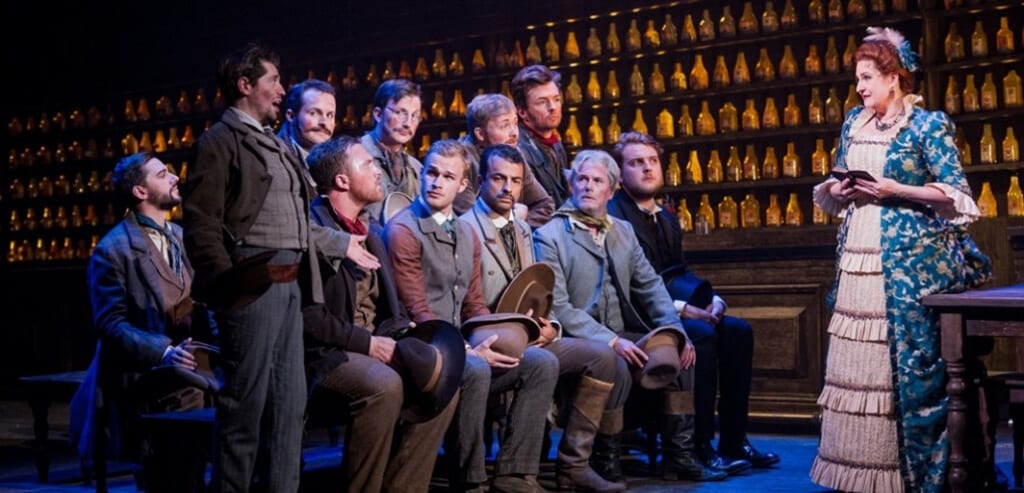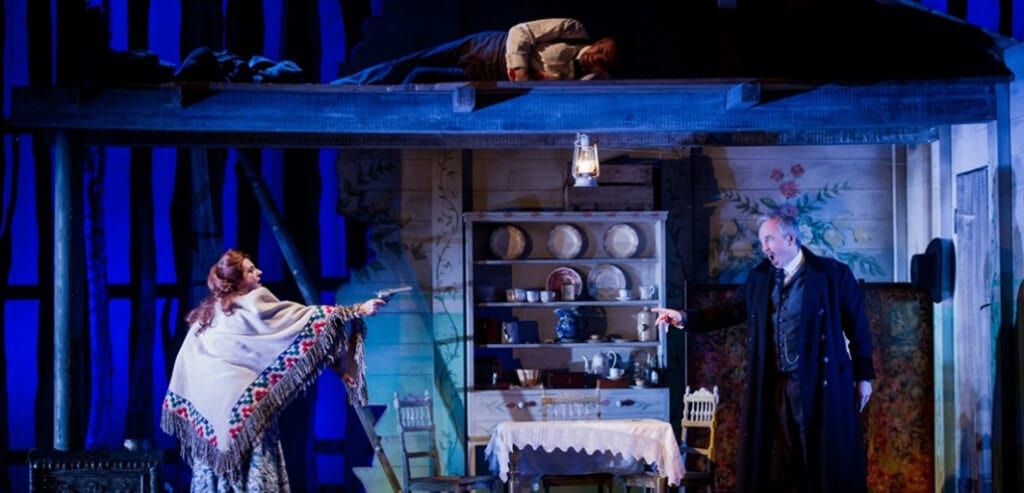This is the final year of Opera Grange Park’s eighteen-year residency at its tastefully derelict neo-classical home, Northington Grange, hidden in the idyllic folds of the Hampshire Downs. Next year they move to West Horsley, and to an uncertain future. Country-house opera has a reputation for elitism, but Wasfi Kani, the founder and driving force of this company, is an inspiring figure who has opened up opera to new audiences and locations like no other in the past thirty years. We all had a taste of how this reputation has been acquired in her upbeat, feisty and funny fundraising pitch ahead of the start of the work.
Fanciulla is the ‘Cinderella’ of Puccini’s canon. Despite a strong initial reception at the Metropolitan Opera in 1910, it never took hold of European affections in the same way. By and large it lacks the ready tunefulness of his other six full-length operas, and is through-written rather than offering set-piece arias that can be performed in isolation. However, technically it is possibly his most assured work: there is a constant inter-play between orchestra and voices that ensures continuous harmonic and melodic interest, and a fully integrated emotional commentary on and enactment of the action. Moreover, Belasco’s original novel of the Californian gold-rush offers many strongly-drawn and contrasted characters, thrilling writing for the chorus, a variety of striking locations, and a plot with much more-than-usually plausible incident and tension.
The central three-character rivalry is evocative of Tosca. Minnie Driver (Claire Rutter) runs the Polka whisky bar and gambling den and does the best to keep things amiable between the feuding gold prospectors. Jack Rance, (Stephen Gadd) the local sheriff, has designs on her, and together with a Wells-Fargo agent (Jihoon Kim), is in pursuit of a local bandit, Ramerrez, (Lorenzo Decaro) who arrives in town and ingratiates himself with Minnie as ‘Dick Johnson’. The first act introduces all the characters, the second sees the forces of law and order catch up with ‘Johnson’, and the third sees him escape execution thanks to Minnie’s last minute gun-toting appearance.
The role of Minnie is a great opportunity for a singer-actor, but it is hugely demanding vocally, and requires both show-stopping stage presence and ability to down-size into vulnerability and fear. Rutter has all the right attributes, and carries the role off with both empathy and panache. There is very good chemistry with Decaro, and though his acting was a little awkward elsewhere he gave thrilling vocal shape to his (apparent) farewell to life in Act Three. Just as in Tosca, the venomous animosity between the heroine and the main villain provides some of the best moments of the action. Gadd‘s Rance is older than normally played, and therefore the element of sexual jealousy was less obvious; but in key scenes, such as the poker game in Act Two, his fencing with Rutter was a delight to behold. Though the villain, he has received some fine vocal moments from the composer, and these were very well delivered.
Stephen Barlow gave an incisive reading of this complex score, and there was much orchestral colour from the Bournemouth Symphony Orchestra, and some delightful moments of chamber intimacy to go with the full-blooded moments of verismo colour. The mainly realistic sets worked well on the whole, though the rail trolley in Act Three took up space to little effect, and we could have done without the crude symbolism of the flapping front door in Act Two when the crucial first kiss arrived. Stephen Medcalf’s direction was fluent, and made the stage seem larger and less crowded than it was, while the costumes offered period authenticity and charm.
Barring a few concert performances of Tristan, this is last opera to be performed by this company at The Grange. As Minnie and Johnson said ‘Addio California’ and walked off hand-in-hand into the sunset to a new future, one has to hope that this was prophetic of what is to come not just for them, but for Grange Park Opera too.



